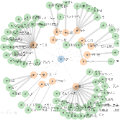Knowledge graphs (KGs) have attracted more and more attentions because of their fundamental roles in many tasks. Quality evaluation for KGs is thus crucial and indispensable. Existing methods in this field evaluate KGs by either proposing new quality metrics from different dimensions or measuring performances at KG construction stages. However, there are two major issues with those methods. First, they highly rely on raw data in KGs, which makes KGs' internal information exposed during quality evaluation. Second, they consider more about the quality at data level instead of ability level, where the latter one is more important for downstream applications. To address these issues, we propose a knowledge graph quality evaluation framework under incomplete information (QEII). The quality evaluation task is transformed into an adversarial Q&A game between two KGs. Winner of the game is thus considered to have better qualities. During the evaluation process, no raw data is exposed, which ensures information protection. Experimental results on four pairs of KGs demonstrate that, compared with baselines, the QEII implements a reasonable quality evaluation at ability level under incomplete information.
翻译:知识图谱(KGs)因其在许多任务中的基础角色而吸引了越来越多的关注。因此,对于KGs的质量评估至关重要且不可或缺。该领域中现有的方法通过从不同维度提出新的质量指标或在KG构建阶段衡量性能来评估KGs。然而,这些方法存在两个主要问题。首先,它们高度依赖KGs中的原始数据,这使得KG的内部信息在质量评估过程中暴露。其次,它们更多地考虑了数据层面的质量而不是能力层面,而后者对于下游应用更为重要。为了解决这些问题,我们提出了一个不完全信息下的知识图谱质量评估框架(QEII)。“质量评估”任务被转化为两个KGs之间的对抗性问答游戏。游戏的获胜者因此被认为具有更好的质量。在评估过程中,不会暴露任何原始数据,从而确保信息保护。对四对KGs的实验结果表明,与基线相比,QEII在不完全信息下实现了合理的能力层面的质量评估。

